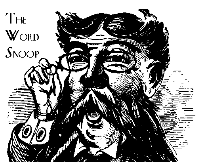
Word Snoop Screws Up -- Film at 11.
Dear Evan: I recently found your column on the Internet, and was horrified to read in one of
your Thanksgiving week columns your quotation from the Dictionary of American Regional English
(in your note about "case quarters"). The mistake was in the source, but you might at least have noted
it in passing. The quotation defined a "case quarter" as "a coin of that particular denomination, as
against the same amount comprised of several coins."

"Comprise" means "embrace"; it is a sort of synonym for "include," except that "include" doesn't necessarily specify every object in the class that it describes, whereas "comprise" is universal. One must therefore say that the larger class comprises the smaller units, not "is comprised of." The latter is an example of what Edwin Newman calls "fake elegance" -- it sounds more hoity-toity than the correct word, "is composed of." Thus "the freight train includes several different types of cars," but "the freight train comprises three box cars, two tank cars, four gondola cars, a locomotive and tender, and one caboose." (That's a dated example, because railroads are discontinuing the use of cabooses, or cabeese, these days.) My authority for this is H.W.Fowler, "Modern English Usage." -- Wallace Riley, via the Internet.
Well, as my father was fond of saying on the subject of such flubs (quoting New York City Mayor Fiorello La Guardia), "I seldom make a mistake, but when I do, it's a beaut." I can't lay claim to that "seldom," but I certainly have won the "beaut" contest this week. What makes my chagrin all the keener is the fact that I have written two columns in as many years on the proper use of "comprise." In my defense, I suppose I might plead overwork in the weeks preceding Thanksgiving, but I still should have read that quotation a bit more carefully. I must have been (to borrow from your railroad example) asleep at the switch. But on the up side, my fumble did elicit your lucid exposition of the proper use of "comprise," for which I am grateful.
Uh, Does Your Wife Own a Chipmunk Suit?
Dear Evan: I have always wondered, but truthfully have never pursued, what is the origin of the saying "he/she is a Nosy Parker." I am particularly interested as my paternal grandmother was a Parker. If you can help me on this one, I thank you in advance. -- Patricia Bensinger, via the internet.
 Now then, class, we can observe in this letter a particularly sophisticated example of the
phenomenon known to devotees of psychobabble as "denial." Ms. Bensinger begins her letter with an
admission that she has always wondered what a "Nosy Parker" might be, but then hastens to assure us
that she has never investigated the question. She then attempts to blame her all-consuming curiosity
on her grandmother, hoping to deflect her audience from the growing realization that Ms. Bensinger
herself is, you guessed it, a "Nosy Parker." Well, you can relax, Ms. Bensinger, you're among friends.
Nobody here but us snoops.
Now then, class, we can observe in this letter a particularly sophisticated example of the
phenomenon known to devotees of psychobabble as "denial." Ms. Bensinger begins her letter with an
admission that she has always wondered what a "Nosy Parker" might be, but then hastens to assure us
that she has never investigated the question. She then attempts to blame her all-consuming curiosity
on her grandmother, hoping to deflect her audience from the growing realization that Ms. Bensinger
herself is, you guessed it, a "Nosy Parker." Well, you can relax, Ms. Bensinger, you're among friends.
Nobody here but us snoops.
Just how "Nosy Parker" (also spelled "Nosey") came to mean a snoop or busybody is a bit of a mystery. Since the "Parker" is almost always capitalized, most popular theories interpret it as a proper name and go looking for an especially inquisitive Parker in history. The leading candidate for the original "Nosey Parker" is Matthew Parker, Archbishop of Canterbury from 1559-1575, who was evidently famous for his interest in other people's business.
The problem with the Archbishop theory, however, is that "Nosey Parker" only cropped up in written English in 1907, several centuries after Matthew Parker had stopped snooping around. A more likely explanation, outlined by Hugh Rawson in his marvelous book "Wicked Words" (Crown Publishers, 1989), is that the original "Nosey Parkers" were voyeurs who skulked about London's Hyde Park spying on amorous couples. Bolstering this theory is the fact that park keepers in England used to be known as "parkers," and it strikes me that, in that pre-automotive age, jokes involving "nosey parkers" were probably as common as our modern "cop on Lovers' Lane" variety was in the 1950's.
Perhaps If the Reflecting Pool Were a Bit Deeper....
Dear Evan: More and more, lately, I hear the phrase "sea-change," especially from Washington types. I became curious about its origin, and being part of the sea-change in the use of networked computers, I looked it up on the World Wide Web. I thought at first that it might be biblical, but it's not. Then I checked Shakespeare, and found it there, only once, in a song that Ariel sings in "The Tempest" ("Full fathom five thy father lies..."). Can it be that this one use of the phrase by old William has caused such a sea-change in the language? -- Joseph G. Baron, via the internet.
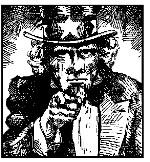 Well, as old William Shakespeare himself would say, "yup." As far as anyone can tell, "sea
change," which means a profound change in the nature of something, is Shakespeare's own invention.
The passage you cite in "The Tempest" is worth quoting in full, both as an illustration of the original
sense of the term as well as for its eerie beauty:
Well, as old William Shakespeare himself would say, "yup." As far as anyone can tell, "sea
change," which means a profound change in the nature of something, is Shakespeare's own invention.
The passage you cite in "The Tempest" is worth quoting in full, both as an illustration of the original
sense of the term as well as for its eerie beauty:
"Full fathom five thy father lies/Of his bones are coral made/Those are pearls that were his eyes/Nothing of him that doth fade/But doth suffer a sea-change/Into something rich and strange."
The "sea change" (which seems to have lately lost its hyphen in common usage) Shakespeare meant is a radical transformation, metaphorically similar to the change wrought by prolonged submersion under water. Thus the English language itself is often said to have undergone a "sea change" when it was imported to the New World, gaining new words and idioms, and becoming, to British ears at least, "something rich and strange."
Similarly, the recent transformation of computer networks from tools to entertainment (oops, I mean "infotainment") centers could, as you note, be seen as a "sea change." It pains me, however, to hear constant chirpings about "sea changes" coming from Washington, where so little actually ever changes. The only genuine "sea change" I can imagine in connection with politicians would also involve the phrase "full fathom five."
Tell Us About Princess Posh Again, Daddy
Dear Evan: Being the father of a seven and a six year old (or should that be olds?), I find myself attempting to explain words and their origins. Thus, my question...what is the origin of the word "dimple?" The explanation I came up with was that there was possibly a king/queen, or some other equally important being, who had these facial tucks and his/her name was Dimple. Therefore, if others had a similar facial feature they were said to have a dimple. Made sense to me...but what is the real story? -- Don Findlay, Washington, Iowa, via the internet.
Making up word origins to quiet the kiddies, are we? Thanks a lot. I hope you realize that your kids are going to be writing to me in twenty years or so, asking if old Dad's beloved story about King Dimple is true. No wonder I feel like a mail-order grinch so much of the time -- I'm debunking large chunks of folks' childhoods.
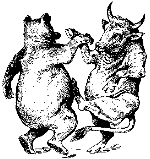 On the other hand, I can't really blame you for winging it with a fanciful story -- people, even
very small ones, love stories about where words came from. Sometimes it's virtually impossible to pry
beloved old word-origin stories from my readers' grasp even after the stories have been proven to be
utter hokum -- witness the hundred or so letters I receive every year insisting that "posh" comes from
"port out, starboard home."
On the other hand, I can't really blame you for winging it with a fanciful story -- people, even
very small ones, love stories about where words came from. Sometimes it's virtually impossible to pry
beloved old word-origin stories from my readers' grasp even after the stories have been proven to be
utter hokum -- witness the hundred or so letters I receive every year insisting that "posh" comes from
"port out, starboard home."
The problem, of course, is that many words just don't have remarkable stories behind them, and "dimple" is a good example. The root of "dimple" is an Old High German word ("tumphilo"), meaning "whirlpool." The first use of "dimple" in English, around the 13th century, was to mean "pothole," which is just about as far from King Dimple as you can get. It wasn't until the 14th century that some folks noticed that some of their fellow citizens' faces were marked with cute little "potholes" and began to call them dimples.
Welcome to the Damnation Bowwows
Dear Evan: Lately I've encountered the use of the word 'effect' in places where I thought 'affect' would have been the correct choice. For example, the other day a noted publication said that something (can't remember what) ". . . still effects the environment." And in a college publication a professor stated that years later his former students were "still effected" by his teaching. In both cases I thought 'affect' would be the correct form. Am I wrong or have we reached a low point in discriminating between these two words? Could you explain the distinction between the two? -- Barney G. Johnson, via the internet.
 We do seem to have reached a low point, as a society, in being able to tell the difference
between "affect" and "effect," but I see no need to surrender the fight. Much of the problem with these
two words stems from the fact that each of them can be used as either a noun or a verb, so grasping the
particular context in which "affect" or "effect" is being used is essential to understanding what is
meant.
We do seem to have reached a low point, as a society, in being able to tell the difference
between "affect" and "effect," but I see no need to surrender the fight. Much of the problem with these
two words stems from the fact that each of them can be used as either a noun or a verb, so grasping the
particular context in which "affect" or "effect" is being used is essential to understanding what is
meant.
As a verb, "affect" actually has two meanings. The less common meaning is "to pretend or put on a pretense of." as in "When Harry came back from Europe he embarrassed us all by affecting a French accent." The second, more common meaning is "to influence or change" -- as in "Harry's phony accent annoyed everyone and affected his popularity." Both of your examples used "effect" when this form of "affect" was called for.
"Effect" is also a verb, but it means "to bring about" or "to put into action." Obviously, the professor in your example was not still "effecting" (bringing about) his students of yesteryear -- he was "affecting" (influencing) them.
Confusing "affect" and "effect" as nouns is another common error in using these words, but this one is a bit easier to avoid. "Affect" as a noun, as "a thing," is almost never used except as a technical term in psychology, so we can pretty much rule it out in general usage. Then again, if we spend any more time trying to sort these two words out, we may all need a good psychiatrist.
A Few Fries Short of a Happy Meal
Dear Evan: While a friend and I enjoyed lunch at a local fast-food establishment, we noticed a
sign which had us both wondering. The sign in question referred to "standing on line." My friend
pointed this out, and remarked that she had recently heard several people use the phrase "on line" but
that she (and I) had always heard "in line." What was interesting was that I had also been pondering
this question recently, as I have also heard several people referring to being "on line" as opposed to "in
line." Is there a proper way to refer to being queued up? -- Andrew Rein, via the internet.
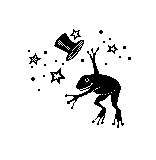
"Enjoying lunch at a local fast-food establishment," you say? You must teach me that trick someday. Every time I set foot in one of those joints, I start brooding about the imminent death of Western civilization and lose my appetite. It must be something in the special sauce that does it.
Neither "on line" nor "in line" is more correct than the other, although "in line" is more common. Since your question came to me over the internet, I have no way of knowing where you live (and, presumably, heard "on line"), but my sense is that the "on line" locution is primarily heard in large cities. It may, in fact, have started in New York City, since the majority of questions I have received on this topic have come from visitors to New York who were struck by the usage.
No one knows, however, why New Yorkers say "on line." Perhaps the answer lies in the pressures of life in a large city. When one stands "in" line, one is part of a group with something in common, even if only a gnawing yen for a Whopper. But in big cities, such as New York, other people often seem more like obstacles than fellow citizens. A line is just another insult to the perpetually fed-up New Yorker, on a par with potholes and subway delays. The shift of preposition from "in" to "on" is probably just another symptom of urban alienation. Would you like fries with that?
Dear Evan: Today I asked a colleague a technical question. I thought I might know the answer but was looking for confirmation. So I told him my best guess and asked, "Do I win a kewpie doll?" And then I proceeded to wonder what the heck a kewpie doll is and why it is called that. My image of the doll is a cheap prize such as those given away at a carnival/boardwalk game. Why "kewpie"? A corruption of "QP"? Meaning what? -- Paul Mailman, via the internet.
 Ah, kewpie dolls. I guess I'd have to call my own feeling about kewpie dolls a sort of second-generation nostalgia, because I'm not old enough to have ever encountered an actual kewpie doll
myself. I do remember, however, coming across numerous references to them in my childhood reading
(mostly, probably, in Mad Magazine, kewpie dolls being conspicuously absent from my other literary
staple of that period, Tom Swift Jr. books.) I spent, as you have, quite a bit of time wondering what
the heck they were.
Ah, kewpie dolls. I guess I'd have to call my own feeling about kewpie dolls a sort of second-generation nostalgia, because I'm not old enough to have ever encountered an actual kewpie doll
myself. I do remember, however, coming across numerous references to them in my childhood reading
(mostly, probably, in Mad Magazine, kewpie dolls being conspicuously absent from my other literary
staple of that period, Tom Swift Jr. books.) I spent, as you have, quite a bit of time wondering what
the heck they were.
Thank heavens for the Oxford English Dictionary, eh? I doubt that defining "kewpie dolls" was exactly what Sir James Murray had in mind when he began compiling his dictionary, but the Second Edition delivers the goods on "kewpie doll" with deadpan good humor: "A chubby doll with a curl or topknot on its head." According to John Ciardi's "Good Words to You," kewpie dolls originally also had wings, and, during one period in early 20th century America, were as wildly popular as teddy bears. The kewpie doll was the invention of a commercial illustrator named Rose O'Neill, whose work, notes Ciardi, "was given to flowing designs of winged, glowing, innocent creatures." The name "kewpie" was, as you may suspect by now, a modification of "Cupid."
Although the kewpie doll made Rose O'Neill a wealthy woman, ironically, her invention is best remembered for its post-kewpie-craze afterlife as, yes, a tacky carnival prize.
I Don't Understand Nail Polish, Either
Dear Evan: I have a question, one that occurred to me as I was putting on my makeup this morning. Why do they call it "mascara"? Every other kind of makeup seems to have logical name -- eye shadow, lipstick, etc. But mascara is a mystery to me. Can you help? -- Amy Harris, via the internet.
What a coincidence -- mascara is a mystery to me, too. Every so often I'll wander through a
room where someone (oh, alright, it's my wife) is watching one of those TV shows where they "make
over" some hapless audience member. The premise of these shows is both simple and terrifying. They
usually take a nice, unpretentious (if slightly dorky) person and turn him or her over to some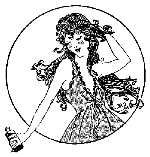 Eurotrash trendoid who proceeds to transform the victim into a crypto-Carnaby Street nightmare. In
the case of male "makeovers," this usually involves nothing more than a silly haircut and an ugly suit,
but the poor women "made over" are invariably also slathered with about four pounds of makeup
somewhere along the way. I like to think they wash it off as soon as they get the chance. My feeling
about makeup is that a little goes a very long way, which, come to think of it, is my feeling about
television, too.
Eurotrash trendoid who proceeds to transform the victim into a crypto-Carnaby Street nightmare. In
the case of male "makeovers," this usually involves nothing more than a silly haircut and an ugly suit,
but the poor women "made over" are invariably also slathered with about four pounds of makeup
somewhere along the way. I like to think they wash it off as soon as they get the chance. My feeling
about makeup is that a little goes a very long way, which, come to think of it, is my feeling about
television, too.
Now that I've alienated an entire industry and several thousand readers, I'll get back to work. "Mascara" is defined by the Random House Webster's College Dictionary as "a cosmetic applied to the eyelashes to make them appear darker or longer." I'm no expert on eyelashes, but I'd guess that "longer" in this case almost certainly refers to length, not duration. Anyway, "mascara" is actually a Spanish word meaning "mask." Oddly enough, the word was originally imported into English as "mascaro" in about 1890 and only became "mascara" about 1922. "Mascara," by the way, also means "soot" in Spanish, a fact which would, all by itself, be enough to keep me away from the stuff.